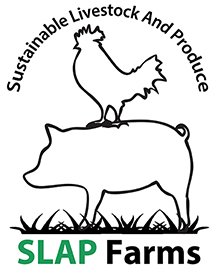Laying hens are commonly kept in large barns, often housing 10s to 100s of thousands of birds frequently in cages. These birds eat a diet that is entirely grain-based. On the other hand, our pasture raised hens live outside eating plants, insects, and worms along with receiving a balanced non-GMO grain feed. They can run around, forage, and express their chicken-ness. As a result, our hens are healthier than caged hens and produce healthier eggs that have:
- Less saturated fat, more polyunsaturated fats
- Higher omega-3 fats and lower omega-6 fats
- Higher levels of vitamin D3, vitamin E, and beta carotene
Why are Eggs from Pastured Hens Healthier?
Forage — the edible portion of plants other than seeds and grains — is an excellent source of beneficial omega-3 fats. Grains such as corn are primarily omega-6 fats. Poultry absorb the fats in their feed relatively unchanged. Thus, conventionally raised poultry that eat only grain-based feeds have higher levels of omega-6 fats. But pasture raised poultry that can supplement their diets with forage naturally have more omega-3 fats.
Omega-3 and omega-6 fats are both forms of polyunsaturated fats that are essential to human health — our bodies cannot make these fats so we must get them from our diet. A diet low in omega-3 fats compared with omega-6s can contribute to inflammation and chronic diseases, such as rheumatoid arthritis, diabetes, atherosclerosis, and heart failure.
Additionally, pastured hens are exposed to sunlight, which stimulates vitamin D3 production — just like in humans — leading to more vitamin D3 in their eggs.
How to Get Real Pastured Eggs
Supermarket egg cartons look like miniature billboards these days with all sorts of claims — “cage free,” free range,” “pasture raised” — all of which conjure up images of hens living outside on green grass enjoying fresh air and sunshine. Sadly, nothing could be farther from the truth.
“Cage free” as defined by the USDA simply means the eggs come from hens that were not kept in cages. Cage free hens do not need to have any access to the outdoors.
“Free range” to most people implies the hens live outdoors. But again, under USDA labeling laws, hens only need to be allowed “access” to the outdoors to be labeled free range. Often this access is provided by a small door in a huge barn that virtually no hens ever use.
“Pasture raised” implies that hens live in green grass in the open, but there are no regulations about how hens must be raised to be labeled “pasture raised” and there is no legal definition of what pasture is — often it may be a dirt lot.
At SLAP Farms, our hens live on pasture — green grass, legumes, and other plants — 24 hours a day, 7 days a week. They are protected from ground predators by electrified net fencing and are moved to a fresh section of pasture every week. The pasture is then allowed to rest for at least 6 months before the hens return. This means we do not overburden the land with excess manure and allows time for any parasites or potential disease organisms to die off, ensuring our hens stay happy and healthy.
The only way you can be sure you are getting real pasture raised eggs is to buy directly from small, local farmers. At SLAP Farms our doors are always open and we invite you to come visit us and see how our hens are raised.
To learn more about the health benefits of eggs from pasture raised hens visit www.FoodAnimalConcernsTrust.org.

